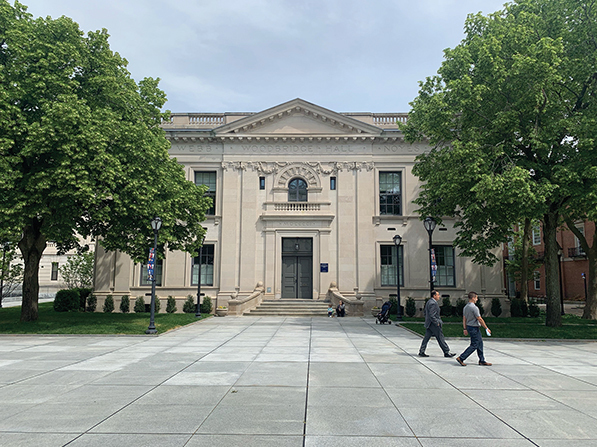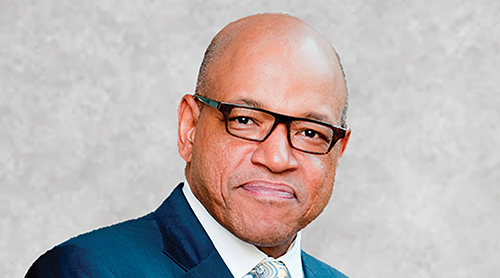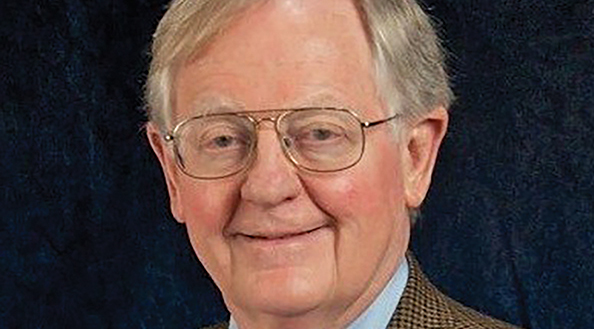
Mark Alden Branch ’86
Woodbridge Hall, where Yale’s trustees meet.
View full image

Mark Alden Branch ’86
Woodbridge Hall, where Yale’s trustees meet.
View full image

Yale University
David A. Thomas ’78, ’86PhD, was elected as an alumni fellow.
View full image

Yale University
David A. Thomas ’78, ’86PhD, was elected as an alumni fellow.
View full image

Yale University
Victor Ashe ’67 was the first petition candidate on the ballot since 2002.
View full image

Yale University
Victor Ashe ’67 was the first petition candidate on the ballot since 2002.
View full image
Yale alumni elected Morehouse College president David Thomas ’78, ’86PhD, to serve on Yale’s Board of Trustees as an alumni fellow, the university announced on May 25. A day earlier, the Board had announced that it was eliminating the option for alumni fellow candidates to get onto the ballot by petition—the process used by the other candidate in this year’s election, former US ambassador to Poland Victor Ashe ’67.
Thomas was the single candidate selected this year by the Yale Alumni Association’s volunteer-led, 14-member Alumni Fellow Nominating Committee (AFNC). Ashe qualified for the ballot by obtaining more than the required 4,394 alumni signatures. The university reported that 15.5 percent of eligible alumni voted; Thomas received 64 percent of the vote, Ashe 36 percent. (Maggie Thomas ’15MEM, a political strategist focused on climate policy, had also qualified for the ballot by petition. She withdrew in January after being appointed to a position in the Biden administration.)
The news had immediate impact for three alumni who had already announced their intentions to run as petition candidates in 2022: Zoraya Hightower ’15MEM, Gail Lavielle ’81MA, and Andy Lipka ’78. The board’s decision applies to next year’s election, so they will not be able to employ the petition process.
The Board of Trustees—historically known as the Yale Corporation—consists of ten trustees appointed by the board itself, six elected by alumni, and the president of the university. (The governor and lieutenant governor of Connecticut are ex officio members.) Alumni have been electing members since 1872, after the state amended the university’s charter, replacing six seats filled by state senators with six elected by the alumni.
In 1929, the petition process was introduced. It has been used sporadically; the most recent petition candidate to win election to the board was William Horowitz ’29, Yale’s first Jewish trustee, who was elected on his second try in 1965. Before Ashe and Thomas, the most recent petition candidate was W. David Lee ’93MDiv, a New Haven minister who ran in 2002 with the support of Yale’s unions. He lost to the AFNC’s candidate, Maya Lin ’81, ’86MArch.
Journalist James Kirchick ’06 and law professor Nicholas Rosenkranz ’92, ’99JD, mounted petition campaigns in 2018 and 2019, respectively, each backed by the conservative William F. Buckley Jr. Program at Yale. Both fell short of the required number of signatures.
In an email to alumni, senior fellow Catharine Bond Hill ’85PhD said the decision to end petition campaigns stemmed from the board’s concern about “issues-based candidacies, with intense campaigning by petitioners who are materially supported by organizations that seek to advance specific platforms.” (Maggie Thomas ran with the aid of Yale Forward, which advocates divestment of the university’s fossil-fuel stocks. Ashe, whose financial supporters included the Buckley Program, ran on a platform of board transparency and reforming the trustee election process.)
Such candidates, Hill wrote, would “do profound disservice to the university by distorting the very nature of what a Yale trustee must be: a fiduciary. . . . At the heart of the matter is the vital distinction between an elected representative of a cause or movement and a person elected without any agenda other than to bring independent judgment to the varied and complex issues facing the university.”
“That’s a completely bogus argument,” says Hightower, a nonprofit executive and Burlington, Vermont, city councilor who was running as Yale Forward’s 2022 candidate. “Everybody is coming with an agenda; some of us are just more transparent about it.”
Hill cited a second reason for the decision: the money and campaigning involved with petition candidacies. Yale Forward managing director Scott Gigante ’21PhD says his group spent $20,000 in its effort to get Maggie Thomas on the ballot. “In their tenor, cost, and time required,” Hill wrote, “these contests may discourage many qualified and desirable candidates from accepting nomination in the first place.”
But Ashe points out that the high number of signatures required—and the fact that Yale does not share alumni contact information with petition candidates—means that candidates like Ashe and Maggie Thomas had to spend money on advertising to make people aware they were running. “They create a system where you have to spend money,” he says. “Then they attack you for spending money.”
The reaction on social media, in letters to this magazine, and in op-ed articles has been overwhelmingly negative. In the Wall Street Journal, lawyer and Democratic political strategist Lanny Davis ’67, ’70LLB, said the move was “contrary to good corporate-governance principles, which aim to give all stakeholders a voice.” He called for a committee of students, alumni, and faculty to investigate the issues around petition candidacies and consider restoring the system. Ashe has another idea: because the Connecticut General Assembly has the power to amend Yale’s charter, he says, legislators should move to “nullify the decision and restore the right to vote.”
Hill says the trustees weren’t surprised by the alumni reaction, and that the Corporation does not plan to reconsider. “At the end of the day,” she says, ”the board has a responsibility to do what it believes to be in the best interests of the university, and our decision was based solely on how we saw that question.”
Even if there is no petition process for next year’s election, any alum may propose candidates to the Alumni Fellow Nominating Committee. Find the form online at alumni.yale.edu/alumni-fellow-nomination-form.
 loading
loading
2 comments
-

Steven Finley, 9:27pm July 17 2021 |  Flag as inappropriate
Flag as inappropriate
-

Flash Sheridan ’82, 9:32pm July 28 2021 |  Flag as inappropriate
Flag as inappropriate
The comment period has expired.President Salovey and Senior Trustee Catherine Bond Hill are pleased that 15.5% of eligible alumni bothered to vote in their sham election. They also are pleased that 9.9% of eligible alumni voted for their chosen candidate. As we are learning, there are many ways to suppress the vote. Lessons to be learned in New Haven, where corporate governance is for other people. Not for the $30 billion dollar Yale, where a self-perpetuating group likes things just as they are.
There is already a petition opposing the elimination, at https://www.change.org/p/president-salovey-reinstate-the-petition-process-for-the-yale-alumni-fellow-election, with over a thousand signatures despite a lack of publicity. In fairness, I have created a petition to see if any alumni support the Board of Trustees: https://www.change.org/p/yale-board-of-trustees-support-the-elimination-of-the-petition-process-for-the-yale-alumni-fellow-election.